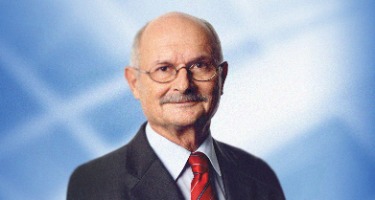This interview was conducted as part of the 2020 Edition of The Best Lawyers in Austria “Law Firm of the Year” award recognitions. Our partner Handelsblatt, also published these awards on June 27, 2019, online and in print in their June 2019 edition.
How are corporate lawyers, across Europe and all other developed economies, contending with a financial and regulatory world of barely detectable interest rates and seemingly fluid compliance requirements? Vienna, Austria–based Fellner Wratzfeld & Partner (FWP), named the country’s “Law Firm of the Year” for Insolvency and Reorganization Law, has a few ideas. FWP partner Markus Fellner sat down with Best Lawyers CEO Phillip Greer to discuss the current state of play—and why his firm is proud to work closely with the visually impaired.
What does it mean to have your practice recognized by its peers as the top 2020 law firm for insolvency and reorganization law?
We’re really proud and thankful. We’re thankful for all the employees working with us, but we’re also thankful for clients trusting in our work, a tremendous increase from when we started in the late ’90s. Considering the tough competition, it’s a reflection of hard work.
In the field of insolvency law and restructuring, we’ve developed special tools and measures for how companies and entities in crisis can successfully reorganize, whether they’re stock-listed or private, family owned or publicly owned. So I think all the clients of FWP deeply appreciate this creative work we have done.
Which cases you’ve worked on have helped you earn this reputation?
One is Immofinanz AG. In 2009, 2010, it was the largest real estate company in Europe. It got into a crisis situation because of some, let’s say, fraudulent behavior of a private Austrian bank. We restructured their big real estate portfolios and now it’s a very successful, still stock-listed company.
In 2017, your firm held an event to promote career prospects for the blind in the legal profession. Have you done more since then?
Yes. In 2016 and 2017 we decided to make corporate social responsibility a big pillar of our work, and therefore decided to support blind lawyers at a practical level. We started with an event with Andy Holzer, a blind mountain climber who reached the seven summits in Tibet and Nepal.
We were deeply impressed that being blind could be a challenge, not only a handicap. So we decided to employ blind lawyers in our firm, and to support blind judges. We had a workshop together with Judge Richard Bernstein of the Michigan Supreme Court, who gave us his experience as a blind judge making rulings, knowing cases. It was really impressive to hear how he works—how state Supreme Court decisions are made by blind judges with fair and transparent proceedings.
Together with the Association of Blind and Visually Handicapped People we took part in the "First Symposium on Corporate Fund Raising“ in Vienna last year. The topic was our cooperation and the two FWP internships for blind and visually impaired students. Those resulted from a panel discussion earlier that year with concerned people, where we discussed legal career options for blind people.
We’re also continuing our engagement in this field of CSR.
Do you see any emerging trends in insolvency and reorganization law, whether the industries that increasingly need it or the types of services needed?
Considering that interest rates in Europe are really low, near zero, and for loans, less than 1 percent a year, companies’ financial burden is far lower than in the past. From the standpoint of the common economy, I think we’re facing a weakening effect. Therefore we see that we’re at the starting point of an operational restructuring that has to be advised on by lawyers.
The financial restructuring you had in the past is shifting to operational restructuring. We have great experience in the retail and construction sectors. In Central Europe we’ve done the sale of retail companies before and during insolvency proceedings, and I think this will be one of lawyers’ major tasks in the coming years. Digitalization of the economy is a great challenge, and companies that are not developing on the cutting edge will lose the contest in Austria. There’s a big field of advisory work to be done there by lawyers as well.
Speaking of retail, there have been major shifts in the way people purchase goods and services as they transition from brick-and-mortar stores to online merchants. How has that affected Austrian companies?
Compared to the rest of Europe, Austria is very competitive so far. I understand that, say, the U.K. is ahead of Austria in online merchants and e-commerce and the digitalization of business. We have to speed up, or we’ll lose our status as a very prosperous economy in Central Europe.
Are there any upcoming projects you’re particularly excited about?
The largest project is not really a classical restructuring or reorganization. It’s the ongoing fight of UniCredit Bank Austria AG against three banks in Austria: Oberbank, BKS Bank AG and Bank für Tirol und Vorarlberg. These 3 banks not currently at the necessary level of corporate-governance compliance. That’s a mirror of developments from 20 years ago which shouldn’t take place currently in Austria—now we have new regulations, new authorities, new equity-restructuring programs, which do not allow for credit institutions that do not comply with corporate governance requirements.
This interview has been edited for length and clarity.
If you need experienced legal representation, use the Best Lawyers Find a Lawyer tool to connect with legal professionals ready to guide you.

































